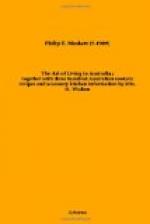The result of moderate exercise in benefiting the nervous system is well known, and the effect of a gentle walk in making the ideas flow through the brain is a matter of common observation. At the same time, it must be borne in mind that exercise, when carried to the verge of fatigue, compels inactivity of the brain for a time, since Nature must have repose. But when carried out in moderation with a view of improving the condition of the body, it conduces to the salubrity of the brain as well, for the latter organ shares in the health of the former. The only thing to guard against is irregular and fitful doses; thus it is far better to take a little in moderation daily, than to attempt to make one day’s exercise suffice for the rest of the week.
It follows from the foregoing, therefore, that without exercise a perfect state of health is an impossibility. There can be no proper bodily health unless there be daily exercise. It is the same with everybody, no matter what the condition of life may be. Exercise is quite as necessary for the well-to-do man as it is for him who is not so circumstanced. The laws of health cannot be violated, and all the money in the world will not atone for neglect in this respect. Exercise is not a matter that can be carried out by proxy. No; each one must take his own exercise, and he derives all the benefit for himself.
It is a fortunate thing, then, that most people have to earn their own living, for the exertion thereby entailed is actually necessary for health. Yet, while this is the case with those who live by their bodily labour, it hardly applies to those who are more dependent upon mental work. For instance, the latter include literary men and journalists, the members of the professions, and those of the vast commercial world—all, indeed, who have brain strain and clerical occupations. In their case the great fault is that they use their heads too much and their limbs too little. For them walking is one of the very best means of obtaining health, and it should be regularly and systematically practised.
It has been said that no man under sixty, unless he be kept walking while at his work, should walk less than six or eight miles a day, if he wishes to keep well and have healthy children. In the cooler weather in Australia these are certainly suitable distances, but in the hot months half these amounts will be found sufficient, and they had better be carried out in the cool of the evening. Then again, for those over sixty it has been well observed that a daily walk is still the best means of promoting health. But the walk must always be proportionate to the strength, and should be done at nothing more than a moderate pace, if a man wishes to take care of his blood vessels.




